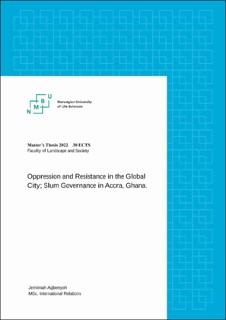| dc.description.abstract | This study explores how slum governance leads to oppression and resistance in Accra. The study area consisted of two slum communities namely Old Fadama and Glefe, located in the capital city of Ghana, Accra. Employing the concept of slum governance, this study examines how slums are coordinated and managed. Thus, it looks at the decision making and implementation role played by both government and non-government actors in managing and preventing slums in Accra. The study applied a case study approach and only qualitative secondary sources were used to collect, analyze and present the data. The data were sourced from policy documents, scholarly articles and media reports.
The outcomes of the study revealed that slum governance in Accra only take the form of decongestion, eviction and demolition and as such has not yielded any significant results. It was found that evictions are often carried out forcefully through intimidation, coercion, and the use of violence without resettlement and compensation. This act which also violates the human right of housing can be described as an “oppression” of the slum dwellers. In return, the government in charge of slum operations face resistance from the affected slum communities which often than not leads to delays in evictions and slum clearances. The resistance, as found out, comes in the form of protests, disobedience, court cases and negotiations. Shockingly, these interventions of the government have not deterred the squatters nor the poor migrants from moving into the slums, hence, slums have proliferated. It can be concluded that slum governance in Accra is not working despite the actions of the government to deal with slums. Thus, there is poor coordination and management of slums which does not promote safe, inclusiveness and sustainability as suggested by SDG 11.
The study therefore suggested that slum governance should be aimed at slum upgrading and not be used as a means to infringe on people’s rights to housing, and employment. Also, multilevel governance through collaboration and participation, involving all local stakeholders, including slum dwellers must be considered to ensure inclusive and sustainable urban development. In addition, the government should consider the creation of secondary and tertiary cities to absorb the increasing migrants from the rural communities, and building institutional capacity and collaboration to limit slum proliferation in the Accra metropolis. | en_US |

